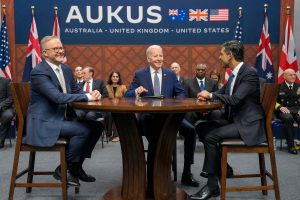The election of Donald Trump as the next president of the United States has understandably led to a flurry of questions about what form his foreign policy will take. Of these, much attention has been paid to determining which issues he will prioritize when he steps into the Oval Office in January. This election campaign, when foreign policy arose, the focus centered on Gaza and the war in Ukraine. While Trump will likely have an impact on both of these conflicts, his reelection constitutes crisis time for AUKUS.
As international agreements go, AUKUS had a tempestuous beginning. The decision by the Australian government to agree a nuclear submarine deal with the United States and United Kingdom, instead of continuing with the deal they had already negotiated with France, was controversial and soured Australia-France relations. French Foreign Minister Jean-Yves Le Drien described the decision as a “stab in the back.” Yet, after such an inauspicious start, AUKUS is one of the biggest defense agreements to be negotiated in years for all parties involved.
As many people will recall from Trump’s first term, Trump had a habit of disliking successful policies from his predecessors. Flagship achievements of the Obama administration were some of the first targets of Trump’s attention – “Obamacare” and the U.S. commitment to the Paris Climate Agreement were two such examples. For the Biden administration, there have been few out-and-out successes, but of these successes, AUKUS is a prime example. Given Trump’s extreme dislike of Biden, his repeated attacks on Biden’s mental competency and record, it is unlikely Trump will overlook this key legacy from the Biden administration.
Equally, Trump has repeatedly articulated his dislike for international cooperation. His disregard for the North Atlantic Treaty Organization (NATO), encapsulated by his description of NATO as “obsolete,” and his disregard for cooperating with the World Health Organization (WHO) both indicate that he will not like AUKUS. While he may favor the focus of AUKUS on balancing against Chinese foreign policy in the Pacific, Trump seems predisposed to disapprove of cooperation with U.S. allies.
Importantly, Trump is also likely to dislike at least one partner in the AUKUS agreement. Possibly the most unexpected topic of the election campaign was Trump’s allegations of foreign involvement in the election by the U.K. Labor Party. As the Labor Party is in government in the United Kingdom, it will be their leader, Keir Starmer, who has to deal with the incoming Trump administration.
Trump had a testy relationship with previous U.K. prime ministers. He clashed with Theresa May over his retweeting of a far-right extremist group from the U.K., and was resistant to Boris Johnson’s attempts at developing a closer bond. These accusations against Starmer’s Labor Party are unlikely to lead to Starmer developing a closer relationship with Trump. These allegations could also be a repeated talking point for Trump, just as the “Russia investigation” or “Russia Hoax” became after his victory in 2016. If this is the case, AUKUS is likely to be at the very least strained by this tension between two of the three members.
Finally, there is Trump’s neglect of the issue of AUKUS and its remit. While on one level, this could be seen as a form of protection for AUKUS from the potential damage Trump would do to the deal, this is likely to be the prime cause of Trump’s dislike. We saw repeatedly during Trump’s first term that when he didn’t know about a topic he was likely to dismiss it. With the South Korea-U.S. free trade deal, NATO, and several other examples, when Trump didn’t know why U.S. involvement would be beneficial, his first recourse was to dismiss the topic.
Trump has made no public reference to AUKUS in his speeches to his rallies. He hasn’t tweeted or posted on Truth Social about it. This lack of interest is likely to be one of the most significant risks to the AUKUS deal and U.S. involvement in it.
AUKUS started on rocky ground. The initial circumstances caused upset in relations between Canberra and Paris at a time when Biden was trying to persuade the world “America’s back.” Yet, since then, AUKUS has continued to progress, further developing the Australia-U.K.-U.S. relationship. While AUKUS itself is unlikely to provide a solution to China-U.S. tensions, it does represent a strong initial step toward balancing against Chinese policy in the Pacific. Backtracking on the deal would send the wrong signals to Beijing and indicate to allies that the United States cannot be relied upon in the Pacific.































